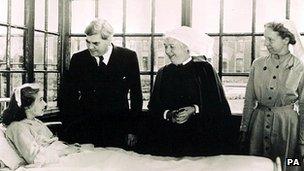Group of GPs warns of 'peril' if NHS changes fail
- Published
- comments
Dr Shane Gordon: "The NHS must change and adapt if it is to remain the service that we want it to be"
More than 50 GPs in new clinical commissioning groups have warned that the NHS in England may be "in peril" if government changes are derailed.
In a Daily Telegraph letter, they say opposition from the British Medical Association is not representative of GPs already leading such groups.
Clinical commissioning groups will control large parts of the NHS budget.
The Health and Social Care Bill, external, which also increases competition with private firms, is going through Parliament.
Health Secretary Andrew Lansley is proposing the biggest shake-up since the NHS was founded in the 1940s.
The existing Primary Care Trusts (PCTs), which manage hospitals, would be abolished and replaced by the clinical commissioning groups (CCGs).
The BMA, the Royal College of Nurses and the Royal College of Midwives have all opposed the proposals, with some critics claiming it is unworkable and "backdoor privatisation", forcing Prime Minister David Cameron to "pause" the proposed shake-up in April last year.
The BMA says government policy is incoherent and major changes are taking place on the ground before the bill has even been passed.
It also says "unanswered questions remain in many crucial areas such as practical implementation and how individual components within the reforms will work together".
But the 56 GPs, part of a coalition formed by the NHS Alliance and the National Association of Primary Care, wrote to the Telegraph claiming previous changes had not gone far enough and the NHS had "paid the price".
'All pull together'
The letter says: "Without strong clinical leadership and the co-ordinated efforts of local clinicians, the NHS itself may be in peril; local services can only be improved if we all pull together."
It adds: "Blanket opposition to the NHS reforms by the British Medical Association and the Royal College of Nursing is not representative of the views of GPs who, like us, already lead CCGs, and the large numbers of GPs and nurses who support us."
The NHS Alliance, which was set up in 1998, describes itself as "an independent non-political organisation".

The NHS is facing the biggest shake-up since it was founded by Aneurin Bevan in 1948
It lobbies on behalf of GPs in clinical commissioning groups, to ensure they remain at the heart of decision-making in the health service.
But the Medical Practitioners' Union - a sub-section of union Unite, questioned how representative the coalition was. President Dr Ron Singer told the BBC that the number of GPs who had signed its letter was "infinitesimal".
Dr Singer said that in just six weeks before the Health and Social Care Bill went to the House of Lords his union had collected the signatures of more than 500 GPs involved in CCGs who wanted the Bill to be withdrawn, or time given to amend it.
The union's petition stated, external: "Poor law, on top of the £20bn efficiency savings target for the NHS over the next five years, will put more lives at risk now and in the future."
Dr Singer said GPs had joined CCG's "because they want to protect their patients - not because they agree with the Bill".
The NHS has been asked to make savings of up to £20bn by 2015.
On Thursday, the government escaped a potentially damaging rebellion over the bill, when the Academy of Medical Royal Colleges decided against releasing a statement critical of it.
Its decision followed last-ditch phone calls from ministers.
However, a poll carried out by the Royal College of GPs suggests 90% of family doctors support calls for the Bill to be withdrawn.